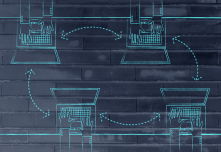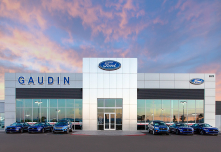
Does your dealership have a customer relationship management solution, or CRM? Let’s rephrase that question in a more relevant way: does your dealership have an effective CRM solution that the staff actually uses in the way it was intended? There is evidence that dealerships that use CRM sell more cars.
A study released in 2016 by VinSolutions and DealerKnows entitled “CRM Usage Report” found that average dealers substantially trailed behind what the report identified as “best-in-class dealers” when it came to using CRM. About 44 percent of average dealers received regular automated reports from their CRM solution, while 83 percent of best-in-class dealers did so. The key is to have a highly usable CRM solution in place, and this was once a tall order.
CRM Had a Rocky Start
Here’s a little secret about customer relationship management (CRM) software: its first generation was a dismal failure. Early CRM software was installed on a company’s premises at great expense and with a long time frame (sometimes, it took years). When the solution was finally up and running, it took several more months to train staff members to use it. More than half the time, sales employees saw the complexity of it and chose not to use it, instead returning to familiar methods like Rolodexes, spreadsheets and desk calendars.
Even in cases where viable CRM solutions were purchased, a number of other factors contributed to poor usage levels. These included a lack of enthusiasm and encouragement from dealerships owners, the wrong type of solution for a dealership’s business, and unclear goals about what the CRM could help dealerships accomplish were common.
That Was Then, This is Now
The good news is that CRM has come a long way in the last 10 to 15 years. CRM is now highly customizable, easy to use, easy to access and relatively inexpensive, since dealerships can pay for only what they use. It’s also very scalable, meaning it can grow with the dealership.
While some car sellers may still long for the days of desk calendars, rolodexes and manually prepared reports, let’s be fair to twenty-first century technology. The Internet and cloud-based solutions have given car dealerships the ability to sell more cars than they ever imagined and to develop meaningful, lasting customer relationships. Customer expectations, honed from car-shopping online, also mandate that dealerships have their customer relationships mapped out properly.
Why Do I Need It?
While you may already have a database of contacts, if it’s not CRM-enabled, it’s probably rather dumb: just a list of names and contact info that may be outdated, duplicated or error-filled. You can’t track when your customers were last contacted, by whom and how, and it’s hard to know if you’re missing sales opportunities when no one ever visits the dark corners of your database. CRM helps you automatically uncover your best sales opportunities and build in actionable accountability for your sales team to follow up these leads.
At its core, a CRM solution should help you accomplish the following tasks in a timely and organized way: appointment setting, contact management, lead management and reporting. Simply put, a good CRM solution should help you increase revenue from sales and service, improve your customer satisfaction and boost your dealership’s gross profit.
What Do All Those Terms Mean?
CRM solution vendors have a tendency to throw terms around that can confuse would-be purchasers. Here are some basic definitions.
Premise-based CRM. This is software that you purchase and install in your dealership on a server in your computer room so everyone can access it. It’s difficult to use outside the building, or on mobile devices such as smartphones and tablets. One of the perceived advantages of premise-based software is that it’s more secure than solutions delivered over the Internet. You pay for this kind of software entirely up front out of capital expenditures.
Hosted CRM. In a hosted CRM situation, you’re still paying for the software, but it’s installed and maintained at a third-party data center on physical server that you either own or lease, and you access it either via a private network or the Internet. You’re still paying for the software up front (as a capital expenditure), and you own it, but you’ll have ongoing costs to a third party for rental of equipment and payment to IT personnel. While you still own the software, the headaches of maintaining it belong to someone else. It becomes easy to use on mobile devices.
Cloud-based CRM, or SaaS (software-as-a-service). Cloud CRM, or SaaS, is a solution that is provided and hosted by a company that stores your dealership’s data online on virtual servers that could be located anywhere. You don’t own the software, but instead pay to use it on a subscription basis. You don’t need to install anything, and regular maintenance, updates and troubleshooting are done by the vendor, who simply gives you a link to begin using the solution. One appealing aspect of the SaaS model for companies is that it can be accounted for out of operating expenses rather than capital expenditures. It can also be easily scaled up or down for more or fewer employees as needed, unlike purchased software.
Should You Use a Generic CRM or an Automotive Dealership-Focused One?
Some dealerships choose the former option, adopting a broad but effective CRM platform like Salesforce Service Cloud nor NetSuite CRM+. Others might see more benefit in using an automotive CRM solution that’s designed to be an element of a suite customized for the auto sales industry.
Broad CRM solutions. The benefit of solutions like Salesforce Service Cloud is the decades of development that have gone into them, making them highly usable, well-tested and complemented by cutting-edge features like artificial intelligence (which can identify the hottest leads to pursue at any moment, for example, or the activities most likely to lead to sales). Because the platform is so widely used, a number of other automotive-focused companies have developed complementary modules to work with Service Cloud. This includes GM OnStar, Toyota and Triumph.
The downside of agnostic solutions is that they may not have evolved to match the complexities inherent in car shopping to encompass both online and in-store behaviors and processes. Dealerships evaluating CRM options should consider the inherent complexity built into their business and whether the CRM will be able to cope with it.
Dealer-focused CRM. Many of these automotive CRM solutions are actually modules that integrate with other software platforms an auto dealership might use, including call management or messaging, an auto-dialing solution for call follow-ups, business development center (BDC), VIN decoding, inventory management, Internet lead management (ILM), showroom control management and reporting modules. Dealer-focused solutions include CDK CRM, DealerCenter, DeskManager by AutoManager and DealerSocket CRM. These business functions may not be available (or not well developed, if they are) with agnostic CRM platforms.
“Dealerships use CRM as the conduit needed to connect the overall consumer buying and ownership experience,” James Beveridge, director of product marketing for CDK Global, told Cantin Automotive Insider. “Systems built specifically for auto retailers integrate critical information from start to finish: data flows from online to in store, incorporates deal-building details and compliance requirements, connects phone, email and text messaging channels of communication, and includes ownership needs including service needs and subsequent shopping activities when the time is right.”
“Usability” Is the Most Important Factor
It doesn’t matter how pleased you are with your automotive CRM solution purchase: if your sales team members won’t use it, it’s costing you money and reaping none of its promised efficiency and cost savings. Early CRM platforms were wildly complex, which is why they were seldom used. It’s important to pick a solution that’s intuitive, easy-to-use and helpful for the sales team. (And this may mean picking one that evolved into high usability because it’s been through many iterations based on user input, so be wary of a solution introduced last week.) While there may be a small amount of training involved, make sure it’s not too onerous.
A critical determination to make is to establish whether the automotive CRM will do its basic job: provide dealership with the ability to follow up with the right leads at the right time with the right proposals and the best offers. Ensure managers are using reporting capabilities to the fullest so they can make more efficient use of time and resources and address the needs of the salesforce they have, not the one they want.












